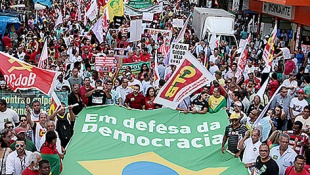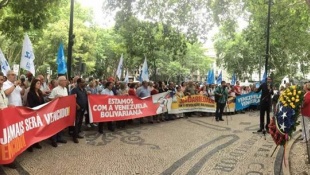Tomorrow will mark 50 years since, on January 20, 1973, Amílcar Cabral, founder and Secretary General of the African Party for the Independence of Guinea and Cape Verde (PAIGC), was assassinated in Conakry – capital of the Republic of Guinea and rear-guard for the popular struggle of the peoples of Guinea-Bissau and Cape Verde for their independence. Murdered by agents in the pay of the Portuguese fascist and colonialist regime.
For the Portuguese Communist Party, evoking this tragic event is a duty of memory, so this monstrous crime is not forgotten, as so many others. A crime that reveals the real nature of Portuguese colonialism and the criminal character of the colonial wars that claimed so many lives.
At a time when the rewriting and falsifying history is used to promote and normalize the most reactionary and aggressive forces around the world, and when, in Portugal, those who long for the past are committed to whitewashing fascism and colonialism and erasing their crimes, it is necessary, with determination, to affirm and defend historical truth and the just march of the workers' struggle and the steps toward their liberation.
Amílcar Cabral was assassinated, but the liberation struggle led by his heroic party did not stop. Rather it imposed new military and political defeats on the fascist colonial government, liberated most of Guinea's territory and, a few months later, on September 24, proclaimed the state of Guinea-Bissau, which most UN members readily recognized.
Amílcar Cabral was assassinated, but the generous ideals that guided his entire life did not die, and the revolutionary force he greatly contributed toward building, PAIGC, continued the struggle until the final victory over colonialism. On September 10, 1974, following the April Revolution, Portugal finally recognized the independence of Guinea-Bissau and on July 5, 1975 Cape Verde became independent.
In this current time of instability and uncertainty in international relations, when imperialism seeks to promote in the popular masses the idea that there is no alternative to its policy of exploitation, confrontation and war and preaches conformism and abandonment, the ideas and work of Amílcar Cabral constitute a precious legacy of confidence in the invincible force of the organized struggle of peoples for their sovereignty and rights, for the transformation of society.
A confidence that PCP does not lack and has never lacked, even in moments of greatest adversity.
This is what PCP expressed in a note by its Secretariat the day after his assassination. After expressing deep indignation and affirming its solidarity and active and fraternal support for the liberation struggle of the Guinean and Cape Verdean people, PCP declared: «the Portuguese Communist Party, expresses to the PAIGC, to the peoples of Guinea-Bissau and Cape Verde, its full confidence that the struggle for which Amílcar Cabral gave his life will continue until its ultimate victory.»
Without aiming to embrace all the extraordinary richness and teachings of the life and work of Amílcar Cabral – which will be the subject of initiatives that PCP is preparing as part of the celebrations of the centenary of his birth – it is appropriate to underline some striking features of his revolutionary thought and action.
From the outset, his patriotism, his close identification with the suffering and aspirations of his people; his deep knowledge of the complex Guinean economic and sociological reality, indispensable for the unity of its different ethnicities in the struggle; the elaboration of a revolutionary line inspired by other experiences of national liberation struggle, but based on the Guinean reality, an original and creative line, as required by all revolutions; a solid Marxist training inspiring his serene and unshakable confidences in victory over colonialism and the construction of a new society, construction that PAIGC initiated in the liberated regions, as witnessed by Rádio Portugal Livre in local reports and broadcasts beginning in August 1971 and published in a clandestine leaflet in Portugal.
As a true patriot, Amílcar Cabral was simultaneously a convinced and consistent internationalist. This is evidenced by its close cooperation with the other national liberation movements in the Portuguese colonies – MPLA, FRELIMO and MLSTP; his active participation in the main regional and world forums focused on the liquidation of colonialism and the anti-imperialist struggle; his appreciation of the historical role of the October Revolution and the recognition of the active solidarity of the socialist countries with the struggle of the Guinean and Cape Verdean peoples. At the International Conference of Solidarity with the People of the Portuguese Colonies, held in June 1970 in Rome, Amílcar Cabral stated: "The socialist camp has always been an ally of our national liberation struggle. It is the socialist countries – and especially the Soviet Union – that provide us with the material we currently need." The recognition of Amílcar Cabral's prestige and authority, at the international level and in the anti-imperialist front, was well expressed when the PAIGC was chosen to represent the entire African national liberation movement at the Conference of Heads of State and Government in Rabat.
A patriot and internationalist, Amílcar Cabral was a great friend of the Portuguese people. He always considered that PAIGC's fight was not against the Portuguese people, but against fascism and Portuguese colonialism. As PCP, he always considered that the Portuguese people and the peoples of Guinea and Cape Verde were allies in the fight against their common enemy. In the present day, this idea and guide to action is of great relevance. Once again there is an urgent need for the unity of those who are the targets of injustice, victims of exploitation, discrimination and inequality, regardless of their origin, eye colour or skin colour, ethnicity or provenance. It is with the unity of all the exploited and wronged that we will be able to successfully confront politics at the service of big capital and advance toward emancipation, liberation and social progress. In an interview with a Cape Verdean newspaper in 1989, Álvaro Cunhal rightly stressed that «among the great merits of Amílcar Cabral, in the struggle for independence, was the firm distinction he made between the Portuguese people, which he considered a friendly people, and fascism and Portuguese colonialism».
Amílcar Cabral – whom fascism called a "terrorist" and who saw all his proposals for a negotiated political solution rejected, leaving PAIGC no alternative but that of armed struggle – stated in an interview with Rádio Portugal Livre: «we are not warriors, we are for peace, we are for understanding, for fraternal friendship with the people of Portugal, for a constructive collaboration between our African land and Portugal, within the framework of the historical, blood and cultural ties that unite us».
Born on September 12, 1924 in Guinea, Amílcar Cabral completed his studies in Portugal, graduating as an agronomist at the Instituto Superior de Agronomia. There, he contacted directly with the struggle of the Portuguese people, developed intense cultural and political activity with other students from the colonies in the House of the Students of the Empire, while participating in the activities of the Movement of Democratic Unity (MUD) and other anti-fascist fronts, thereby building links that would develop into relations of friendship and solidarity between PCP and PAIGC and later also with PAICV. Relations that are a point of pride for Portuguese communists and that are inseparable from PCP's firm and principled position of solidarity, the only party in Portugal that has always fought for the self-determination and independence of the peoples of the Portuguese colonies.
The intervention of Bento Gonçalves at the 6th Congress of the Communist International in 1935 and the decisions of the PCP's 5th V Congress, held in 1957, are striking examples of this. At this Congress, PCP proclaimed with conviction that «the necessary conditions are now created for the peoples of the African colonies dominated by Portugal to conquer their freedom and independence», adding that building an anti-imperialist front with the Portuguese people and the colonial peoples was the task of a Party that knows that a people can not be free when oppressing other peoples.
This position was reaffirmed in PCP's 6th Congress, in 1965, which approved the Party's program and included among the eight fundamental objectives of the Democratic and National Revolution: «to recognize and ensure the right to immediate independence to the peoples of the Portuguese colonies». An objective achieved by the April Revolution, proving Alvaro Cunhal right when, in his work "Towards Victory", he stated that «the struggle for independence of the peoples of the colonies is a powerful aid to the struggle of the Portuguese people for democracy. And the struggle of the Portuguese people for democracy is a powerful aid to the struggle of the colonial peoples. »
PCP was the only party that, since its foundation, denounced the crimes of colonialism, fought the colonialist and neo-colonialist theses of the liberal and social-Democratic opposition, developed a systematic action against the colonial war, including the armed action of ARA against the military apparatus of the colonial war.
The victory over neo-colonial conceptions and opportunist tactics became evident at the Aveiro Congress of the Democratic Opposition, in April 1973, as well as in the increasing understanding, within the Portuguese Armed Forces, of the need to overthrow fascism and end the colonial wars. Such advances in identifying the common objectives and nature of the national liberation struggle in Africa and of the struggle against the fascist regime in Portugal are inseparable from the popular and profoundly democratic character of the struggles of the Portuguese people and the national liberation movements of the African peoples and, simultaneously, from the discussion, resistance and struggle within the barracks and in the very theatre of the colonial wars, a struggle in which the communists, following the guidance of their Party, played the most prominent role.
Those who today aim to diminish and erase PCP's role, while overvaluing the anti-colonial positions of others that emerged with the approaching April Revolution, do a disservice to the establishment of historical truth and the education of the new generations.
The struggle in defence of historical truth is assuming great importance on the occasion of the 50th anniversary of April 25. PCP's Central Committee, on December 8, decided to promote a wide range of initiatives on the April Revolution and what it really represented, toward the projection of its values and achievements for the current struggle against right-wing politics, for a patriotic and left-wing Alternative, for an advanced democracy, for socialism.
A struggle that also involves the fight against the promotion of reactionary and fascistic forces, projects and conceptions, against racism, xenophobia and neo-colonialism in its most diverse expressions, and for the values of freedom, democracy, patriotism and internationalism.
This is also the time to defend the truth about the real nature and main beneficiaries of colonial exploitation; the reasons for the longevity of Portuguese colonialism, the last great empire to disappear; the interconnection between the April Revolution in Portugal and the conquest of independence by the peoples of Angola, Cape Verde, Guinea-Bissau, Mozambique and São Tomé and Príncipe. In Cape Verde, the Tarrafal concentration camp, where so many Portuguese anti-fascists – including many communists – and African Patriots were imprisoned and died, is a dramatic testimony of the terrorist violence that befell the peoples who fought and defeated a common enemy, a testimony that must be preserved.
The so-called “civilizing mission” of Portuguese colonialism and its so-called “luso-tropicality” is clearly expressed in the violent exploitation, the terrible backwardness in which Guinea found itself, the enormous illiteracy rate, the horrors of war and the massacres. Such as the massacre of August 3, 1959, in the Port of Pidjiguiti, in Bissau, with the death of dozens of workers and numerous injured, an event that would determine the turn to armed struggle in the rural areas, as conceived by Amílcar Cabral and unleashed by PAIGC in January 1963, with the attack on the Tite barracks in southern Guinea.
The beneficiaries of colonial exploitation were the large Portuguese economic groups, such as the CUF group – which through Casa Gouveia practically dominated Guinea – and large foreign companies that directly exploited the main resources of the colonies. The complicity and political support of the great imperialist powers and NATO allowed the longevity of the Portuguese colonial empire.
Behind Portuguese colonial domination was foreign imperialist rule – by the British, American, German, Belgian and French empires.
Portugal was simultaneously a colonizing and colonized country, a particularity of the Portuguese situation that determined that the Portuguese people and the peoples of Angola, Cape Verde, Guinea, Mozambique and São Tomé and Príncipe were objectively allies in the fight against their common enemy: fascism and Portuguese colonialism. The decolonization process revealed the extraordinary force of this reality. All operations aimed at stopping the independence of the colonies and reversing the course of the revolutionary process in Portugal were defeated and António Spínola himself, then President of the Republic, was forced to accept the independences, against his aims.
The liquidation of fascism in Portugal and the conquest of independence by Guinea and other Portuguese colonies corresponded to a historical need and the will of the peoples. Any attempts to subvert factual reality must be fought head-on. All the more so when, at the international level, in the name of a refined concept of “Western civilization”, we observe the development of conceptions and practices of re-colonization that pose great dangers to the independence and progress of African peoples.
By evoking Amílcar Cabral, we honour one of the leaders of the national liberation struggle of the African peoples, which marked a whole period of impetuous advance of social and national emancipation in the world. However, fifty years after the assassination of Amílcar Cabral, one can not ignore the difficulties, setbacks and dangers these peoples are facing due to the ideological, economic and military counter-offensive of imperialism.
To our comrades and friends of the PAICV and PAIGC, to all our guests present here, the representatives of various countries and various political forces, of so much history and so much struggle, we affirm that PCP, today as in the past, remains committed to the principles and objectives that were and continue to be at the basis of the common struggle of peoples for peace, for sovereignty, for rights, including the right to development and social progress, for liberation from all forms of exploitation and oppression, convinced that, sooner rather than later, the ideals to which Amílcar Cabral dedicated your whole life will eventually triumph.
Long live Amílcar Cabral!
Long live the liberation struggle of the peoples!
Long live internationalist solidarity!
The struggle continues!




























